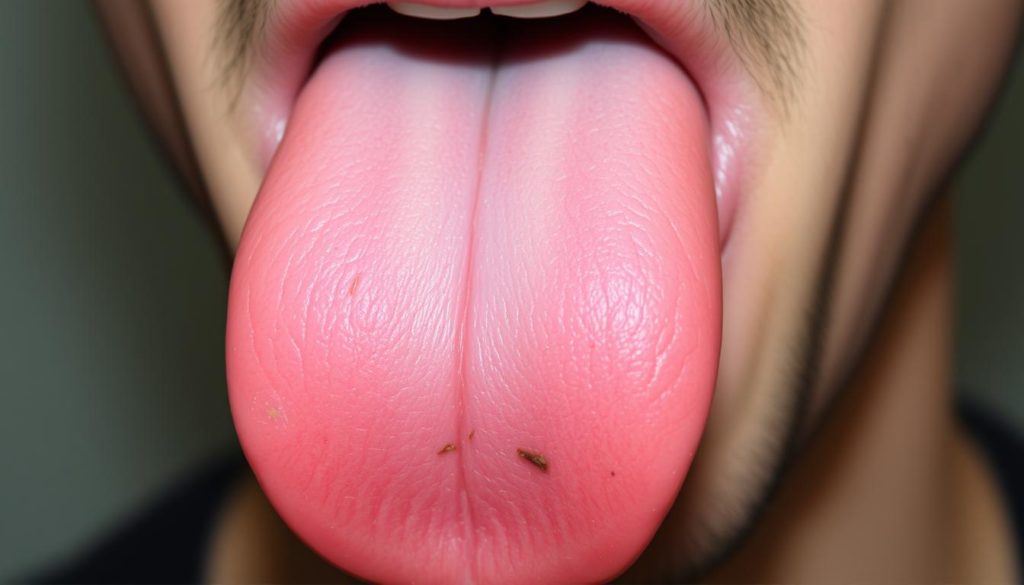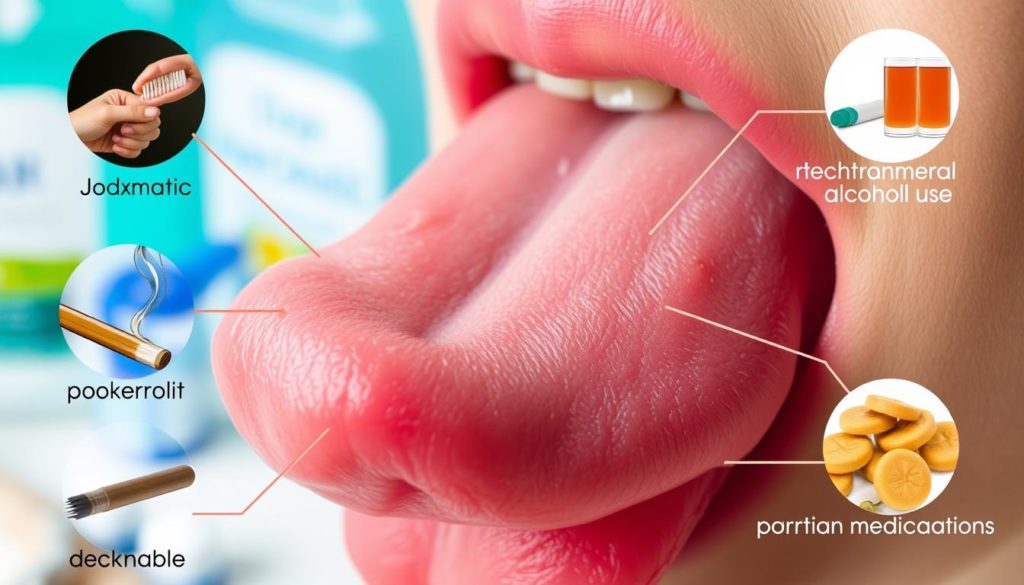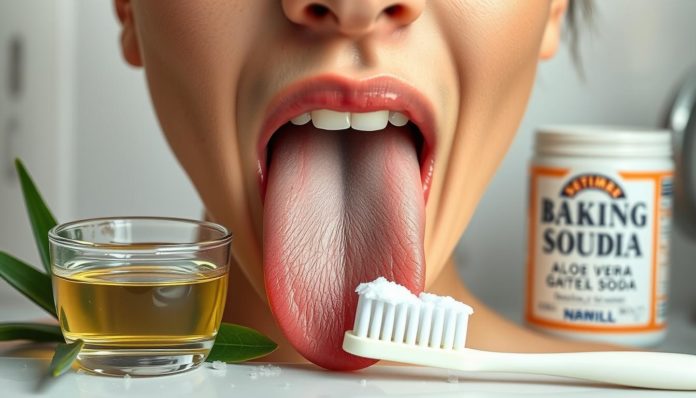Did you know up to 13% of people worldwide have had black hairy tongue? This high number highlights a oral health issue that’s often overlooked. Knowing about black hairy tongue and how to care for it can really help those affected.
Black hairy tongue isn’t just about color changes. It’s a condition that impacts tongue health. Tiny projections on the tongue can grow and darken for many reasons. We’ll look at what causes black hairy tongue and how to treat it.
Keeping up with good oral hygiene can prevent black hairy tongue. It’s key to keeping your mouth healthy. We’ll talk about how to avoid this condition and keep your smile bright.
What is Black Hairy Tongue?
Black Hairy Tongue is where the tongue’s surface grows longer papillae, turning discolored and hair-like. This can worry people, but understanding it helps manage it better.

Definition
The Mayo Clinic says Black Hairy Tongue is a safe, short-term oral condition. It looks scary, but it’s usually not harmful. It happens when dead skin cells build up on the tongue’s small projections, the papillae, making them look like hairs. It’s more common in older adults but can happen at any age.
Characteristics
It often turns black or brown due to food, bacteria, or other things getting stuck in the long papillae. This can cause bad breath and a weird taste. Keeping the mouth clean is key to fixing this problem.
Some people might need extra tests to check for other health issues. Seeing a dentist often helps keep the tongue healthy and avoids more serious problems.
Common Causes of Black Hairy Tongue
Many different factors can lead to black hairy tongue (BHT). Knowing these causes can help in managing and avoiding it.
Oral Hygiene Habits
One main cause of tongue discoloration is poor oral hygiene. If you don’t clean your tongue properly or often, dead cells can gather. This creates a place where bacteria can grow. Keeping a good oral care routine is very important. Brushing, flossing, and using a tongue scraper regularly helps keep your tongue healthy.

Dietary Factors
Your diet greatly affects your oral health. Foods and drinks high in tannins, like coffee, tea, and red wine, can lead to BHT. Also, eating too many soft foods might not scrub your tongue clean. A varied diet with different textures can help stop tongue discoloration.
Recognizing Symptoms of Black Hairy Tongue
Knowing the symptoms of black hairy tongue helps in getting the right treatment early. This condition shows itself not just by how it looks.
Bad breath that won’t go away is a common sign. This smell comes from the mouth and can be very bothersome.
Some people feel like gagging or a tickle in their throat. This happens because the tongue’s surface grows longer than normal.
Many also notice their food tastes different. Things might not taste as good, which can make you not want to eat. These tongue health indicators greatly affect your daily life and health.
Key indicators to watch for include:
- Bad breath (halitosis)
- Gagging or tickling sensation in the throat
- Altered taste perception
If you see any of these symptoms of black hairy tongue, seeing a doctor is essential. They can tell you how to treat it and get your tongue back to normal.
Risk Factors Associated with Hairy Tongue
Black Hairy Tongue (BHT) is more than a cosmetic issue. It can really impact your oral health. Poor oral hygiene, smoking, and a lot of alcohol use are major causes.
Smokers are at a big risk, health experts say. Smoking can lower blood flow to the tongue, make less saliva, and help bacteria and fungus grow. This often makes the tongue’s papillae grow long and turn black.
Drinking too much alcohol is also bad. It makes the mouth dry by reducing saliva. Saliva is important for keeping the mouth clean and having good bacteria. Not having enough saliva increases the risk of BHT.
Certain medicines can also cause Black Hairy Tongue. Antibiotics can mess up the mouth’s normal bacteria. Chemotherapy can also change your oral health a lot.
| Risk Factor | Impact on Hairy Tongue |
|---|---|
| Smoking | Reduces blood flow, impairs saliva production, promotes bacterial growth |
| Heavy Alcohol Use | Dehydrates mouth, lowers saliva production |
| Medications | Disrupts bacterial balance, changes oral environment |
Understanding these risk factors can help you avoid hairy tongue. By improving oral hygiene and making better lifestyle choices, you might reduce your risk.
How to Prevent Black Hairy Tongue
To keep your tongue healthy, follow a few easy steps. This will help you avoid black hairy tongue. Paying attention to daily oral hygiene and what you eat is essential.
Daily Oral Hygiene Practices
One vital step is cleaning your tongue well every day. Let’s improve your daily oral care:
- Brush your tongue: Use a soft brush to gently clean your tongue. This removes food bits and bacteria that cause color changes.
- Floss regularly: Flossing gets rid of food stuck between your teeth, stopping bacteria growth.
- Rinse properly: An antibacterial mouthwash can help keep bacteria levels low.
Dietary Recommendations
Your diet greatly affects your oral health. Here are some dietary tips for tongue health you should follow:
| Foods to Include | Benefits |
|---|---|
| Fresh fruits and vegetables | They have a lot of water, which cleans your tongue and teeth. |
| Probiotic yogurt | This supports good bacteria that fight oral problems. |
| Whole grains | They are full of vitamins and minerals for oral health. |
With these easy tips and healthy foods, you can prevent black hairy tongue. Remember, keeping up with oral care and choosing the right foods are important. They keep your tongue and mouth healthy.
Effective Treatments for Hairy Tongue
Treating Black Hairy Tongue includes both seeing a dentist and caring for it at home. These methods relieve symptoms and prevent them from coming back.
Professional Dental Care
Going to the dentist is crucial for treating tongue issues. They often use cleaning techniques to get rid of long papillae.
Dr. Morgan Smith, a well-known dentist at the American Dental Association explains, “Debridement is crucial as it physically removes the elongated papillae, improving oral aesthetics and function.”
Regular dental visits help catch and solve problems early. This cuts down on the chance of the issue returning.
Home Remedies
Self-care is key for handling this condition. Doing simple things every day makes a big difference:
- Brushing the tongue twice a day with a soft brush.
- Using a scraper to get rid of gunk and germs.
- Keeping teeth clean and avoiding things like smoking and too much coffee.
Some people get better by rinsing with a peroxide mix. It cleans off dead cells on the tongue.
Dr. Emily Lowe stresses, “The best way to tackle Black Hairy Tongue is by combining dentist visits with home care. Staying consistent is crucial for oral health.”
To wrap it up, both seeing a dentist and following a good home care routine can greatly fix the condition. And it helps keep it from coming back.
The Role of Oral Hygiene in Tongue Health
Taking care of your tongue is vital, yet it’s often forgotten in oral hygiene talks. Your tongue is key for talking, eating, and tasting. So, including it in your daily oral care is important.
Visiting the dentist regularly is key for preventing dental problems. These visits allow experts to spot and fix issues early. Taking care of your oral health does more than keeping your smile bright. It also improves your overall health. Brushing or scraping your tongue is crucial. It gets rid of food bits, germs, and dead cells that can cause tongue issues like Black Hairy Tongue (BHT).
Sticking to an oral care routine protects you from mouth diseases. Studies show people who focus on oral hygiene rarely have tongue problems. Using a tongue scraper or brush can work better for tongue health than just toothbrushing.
- Brush your teeth at least twice a day with fluoride toothpaste.
- Floss daily to remove plaque and food particles between teeth.
- Incorporate tongue brushing or scraping into your routine.
- Rinse with an antibacterial mouthwash to reduce bacteria.
- Visit your dentist at least twice a year for professional cleanings.
Adding these steps to your daily life highlights the role of oral hygiene in keeping your mouth healthy. Regular care has huge benefits, not just for tongue health but your overall health too.
Relationship Between Diet and Tongue Discoloration
Your diet greatly affects your oral health, including how your tongue looks. Knowing what foods to eat and avoid helps keep your tongue healthy and clean.
Foods to Avoid
There are certain foods and drinks that make your tongue change color. These include:
- Black coffee and tea
- Red wine
- Dark berries (like blueberries and blackberries)
- Soy sauce
- Colored candies and beverages
They stain because they are rich in color. Eating less of these helps your tongue stay healthy.
Beneficial Foods
Some foods actually help your tongue and mouth stay healthy. They are:
- Apples
- Carrots
- Celery
- Leafy greens
- Yogurt
These foods are good for your oral health. They keep your tongue’s color and texture right with their cleansers and nutrients.
Limiting bad foods while eating more good ones will make your oral hygiene better. It will also make your tongue look nicer.
When to See a Dentist
Knowing when to see a dentist is crucial for dealing with black hairy tongue. You should watch your tongue regularly for any changes. Some discoloration is okay, but certain signs mean it’s time to talk to a dentist.
A detailed oral health checkup might show reasons behind the condition. If discoloration, bad breath, or a hairy feeling last despite good care, see a dentist.
- Persistent discoloration or dark patches on the tongue that don’t improve with home care.
- Discomfort, pain, or a burning sensation on the tongue.
- Unusual texture, such as a hairy or furry feel, persisting over weeks.
- Accompanying symptoms like bad breath, which does not improve after brushing and cleaning.
At an oral health checkup, a dentist can examine these signs closely. They offer advice and treatment options. This helps avoid more issues and gives you peace of mind.
“Early intervention by a dental professional can help manage and treat black hairy tongue more effectively,” explains Dr. Michael Barnett, a renowned oral health specialist. “It’s crucial not to ignore persistent symptoms.”
Knowing when to get a dental consultation for black hairy tongue is key. Timely care and regular dental check-ups keep your oral health good. They help catch and deal with issues fast.
| Symptoms | Action Needed |
|---|---|
| Persistent discoloration | Schedule a dental consultation |
| Discomfort or soreness | Seek professional dental care |
| Bad breath and hairy texture | Request an oral health checkup |
Understanding the Psychology of Tongue Conditions
Visible oral health problems like black hairy tongue (BHT) deeply impact a person’s mental health. The effect of tongue colors isn’t just about looks. It also hits self-esteem and how we interact with others. Those with BHT might feel anxious, ashamed, or depressed because of their condition.
Many studies show how mental and oral health are connected. Oral problems can make people more self-conscious and less social. This is often because they’re scared of being judged or laughed at. It shows we need to treat not just the body, but the mind too.
Treating black hairy tongue means looking after your emotional well-being too. Getting through it can involve therapy, joining support groups, and talking to family and friends. Support and professional help can make it easier to deal with BHT. This way, people improve their oral and mental health together.
FAQ
What causes black hairy tongue?
Black hairy tongue results from poor oral care, smoking, and heavy drinking. Certain medicines and foods also contribute to it. This condition makes tongue papillae long, allowing bacteria or fungi to color it.
How can I prevent black hairy tongue?
Keeping your mouth clean is key. Brush your teeth and tongue, floss, and use antibacterial mouthwash regularly. Also, stop smoking and cut down on alcohol.
What are the symptoms of black hairy tongue?
The symptoms are a tongue that’s black or brown, looks hairy, and smells bad. You might feel like gagging or notice a change in taste. It’s not usually painful but can feel odd.
Is black hairy tongue harmful?
No, it’s not harmful. It’s a sign that you need better oral care, though. Cleaning your mouth well can fix it.
What treatments are available for black hairy tongue?
Treatments include a dentist’s cleaning, good oral care practices, and tackling any direct causes. Scrubbing your tongue can help too.
In serious cases, your dentist might suggest more specific treatments.
Can my diet affect the health of my tongue?
Yes, your diet matters. Sugar, coffee, and alcohol can darken your tongue. Eating lots of fruits, vegetables, and drinking water keeps it healthy.
When should I see a dentist about black hairy tongue?
Visit a dentist if the condition stays or if it hurts, causes you discomfort, or other bad symptoms show up. They will figure out what’s wrong and how to fix it.
What role does oral hygiene play in preventing tongue conditions?
Good oral hygiene stops tongue problems like black hairy tongue. Brush, floss, and get dental checkups to keep your mouth germ-free. This lowers the chance of bacteria and fungi that cause problems.
Are there psychological effects associated with black hairy tongue?
Yes. Seeing your tongue look different can affect how you feel about yourself and act with others. Getting it treated can boost your confidence and happiness.
What foods should be avoided to prevent tongue discoloration?
Stay away from coffee, tea, certain spices, and tobacco. They can stain your tongue. Eating fresh veggies, fruits, and drinking water helps keep your tongue looking good.


